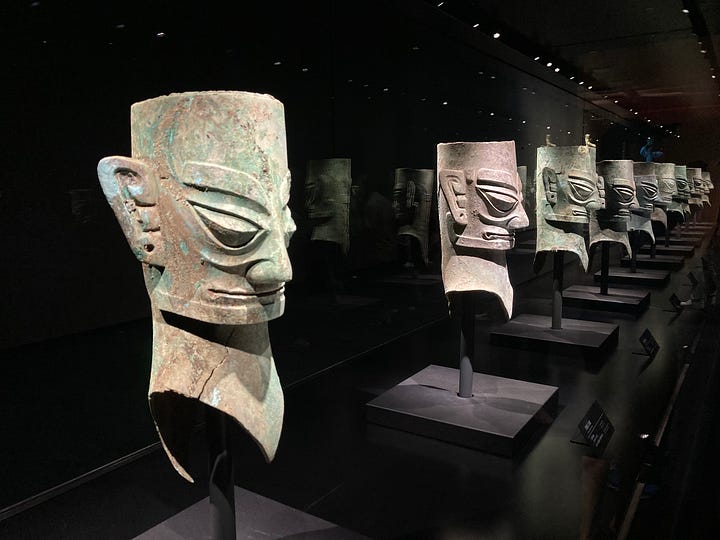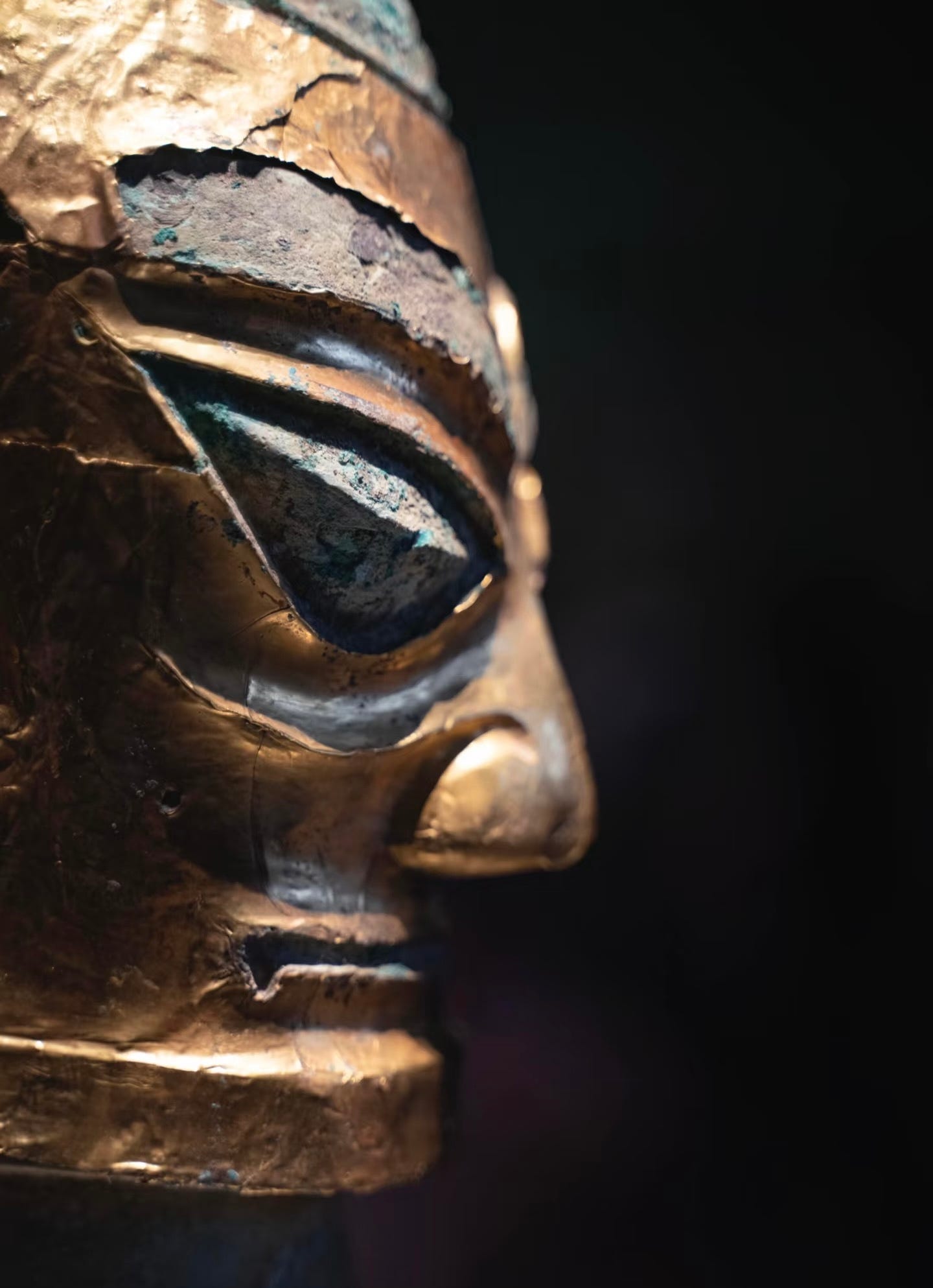In the province of Sichuan, where the ancient kingdom of Shu once stood, archaeologists discovered in 1929 what would become one of China's most enigmatic archaeological sites: Sanxingdui (三星堆). The artefacts unearthed there: bronze masks with protruding eyes, towering bronze trees, gold sceptres, and jade objects of inexplicable purpose… defied conventional understanding of Bronze Age civilisation in China. Their otherworldly appearance gave rise to endless theories about their origins, ranging from alien influence to a lost civilisation that had mastered technology far beyond our understanding.
I visited the site in the winter of 2024, when the museum had just launched their much-anticipated virtual reality experience titled "Walking with the Ancient Shu." The promotional materials promised complete immersion in the civilisation that had created these mysterious artefacts. The technology, they claimed, was based on the latest archaeological findings and enhanced by artificial intelligence reconstruction.
The attending technician fitted the headset over my eyes with practised efficiency. "Remember," she said, "everything you're about to experience is a simulation." Her words would prove both true and false in ways I could not yet comprehend.
The virtual world materialised around me with startling clarity. I stood in what appeared to be a Bronze Age workshop, surrounded by artisans crafting the very masks I had seen in museum displays. The detail was extraordinary: I could see the sweat on the craftsmen's brows, smell the molten bronze, and hear the rhythmic tapping of tools against metal.
My first instinct was to touch one of the completed masks resting on a nearby table. As my hand approached its surface, I experienced a peculiar sensation: for a fraction of a second, I felt the cool, smooth bronze beneath my fingertips, but in the next instant, my hand passed through it entirely. The cognitive dissonance was jarring, like trying to grasp water in a dream.
This led me to experiment with the limitations of the virtual space. I walked through walls, passed through the bodies of the virtual inhabitants, and even leaped from a cliff's edge, hovering in mid-air like a character in those ancient texts describing the supernatural abilities of Maoshan Daoist priests (茅山道士). These mystics, according to legend, could walk through walls and float through the air by understanding the illusory nature of physical reality, much as I was doing now in this virtual space.
The parallel was not lost on me. If those ancient priests could transcend physical limitations by believing in their non-existence, what separated their reality from my current state? What, indeed, separated my ordinary reality from this simulation?
These philosophical musings were interrupted by the sound of drums. The villagers around me began moving toward a central plaza where a ritual was about to begin. Unlike the other visitors I could sense sharing this virtual space (their presence indicated by floating nametags in my peripheral vision), I did not join the reverent crowd kneeling before the altar. Instead, I walked directly toward the high priest.
He wore one of the iconic bronze masks—those impossibly large eyes, that enigmatic smile that had puzzled archaeologists for decades. Acting on an impulse I still cannot explain, I stepped forward, intending to pass through his body as I had done with others in this virtual world.
But something was different.
I felt resistance.
The high priest's eyes, visible through the mask's eye holes, met mine. They were not the programmed gaze of an NPC, but held the depth and intelligence of genuine consciousness.
And then, he blinked.
That's when I awoke. Or perhaps "awoke" is not the correct term, for I found myself lying on a reed mat in a humble dwelling, sunlight streaming through a bamboo window. Two children burst through the door, speaking in an ancient dialect of Shu that, impossibly, I could understand.
"Hurry! The sacrifice is about to begin!"
My virtual reality headset was gone. My modern clothes had been replaced by simple hemp garments. When I touched my face, I felt my own skin, not the familiar pressure of the VR device.
The children pulled me to the ritual ground, where I found myself kneeling among the villagers, participating in dances I somehow knew by heart. The high priest appeared, the same one I had encountered in the simulation, wearing the same bronze mask. He carried a golden sceptre, its surface decorated with patterns I recognised from museum displays millennia in the future.
He pointed the sceptre at me, and the crowd fell silent. At that moment, I understood with terrible clarity why certain artefacts had never been found at Sanxingdui and why certain mysteries remained unsolved. I was about to become one of those mysteries.
The high priest spoke in a voice that seemed to echo from both the distant past and the far future: "The cycle continues. As it was in the simulation, so it must be in reality, if indeed there is any difference between the two."
Archaeological Note (Sanxingdui Museum Archive, circa 4025 CE):
Among the most puzzling artefacts discovered in the twenty-first century excavations at Sanxingdui was a small device, approximately the size of a human palm, made of materials that should not have existed in the Bronze Age. Initial analysis suggested it was some form of display technology, but its purpose remained unclear until the discovery of encoded data within its crystal matrix. The data appeared to contain fragments of a virtual reality programme, but more intriguingly, it also held what seemed to be human consciousness patterns dated to both the third millennium BCE and the early twenty-first century CE.
Even more perplexing was the discovery of ancient texts describing a ritual sacrifice in which the victim appeared to exist in two time periods simultaneously. The texts mention a "visitor from beyond time" who wore "mysterious eyes of glass and light."
The contemporary hypothesis suggests these findings may be connected to the disappearance of a museum visitor in 2025, though this theory remains controversial in archaeological circles. The visitor's last recorded words before vanishing were reportedly: "What if our reality is just another layer of simulation?"
The case remains open.
*Note: This document is part of the Quantum Archaeological Archive, Classification: Temporal Anomaly - Level Φ










I liked this story and tried for second reading .
when a very strange thing happened. It was not funny though.
So I said : Not funny Freud, you are predictable and very annoying.
Magpie Freud is at my windowsill edge again and his eyes scan my desk and taps the window with his beak. Ever since my new practice to draw my blinds and let the sunlight bathe my desk to create a sand box to germinate and grow ideas Freud has been a regular visitor.
Shouldn't he be with his flock building that mythical bridge to Heaven to inspire lovers and connection?
Oh no ! Don't tell me, Freud has broken away from the crowd to go on solo journey of exploration and discovery. Go on then Freud become a Digital Magpie Nomad and fly to different territories away from my home.
Freud is at it again, scanning my desk, maybe he is looking for that plate of sliced baked New York cheese cake and coffee that I used to indulge in when reading Camellia latest installment ?
Too bad Freud, I changed my diet and have cut out the cheese cake and now only drink coffee - with a dew drops of a Nootropic fused with Kakudu plum; about 100 times more Vitamin C than a lemon. A super food for super ideas and a razor sharp mind to boot before I write or compose.
It occurred to me Freud saw that I discovered Camellia first, so finders keepers and she is mine to read alone. So do not steal my reading pleasure, or worse you whole flock to feast at my window. Fly away and find your own or visit or checkout Xiaohongshu.
Stop tapping at my window or I will call the Council pest control.
I hope Freud is an isolated case or this could bothersome.
WOW, OMG incredible and magnificent -- 这很漂亮 , to say the least.
That you so much 杨小姐
This is awesome and very valuable information to deepen my knowledge of 中国文化和历史
你的写作令人眼花缭乱,超凡脱俗
你的代码是纯粹的爱
深深感谢老师
PS you opened Pandora's box :)
PPS 你是对的,2025 年是变革性的
PPS 愿你比闪亮的星星更长寿